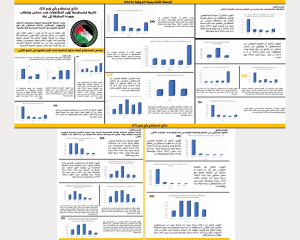
The International Academic Campaign against Israeli Occupation and Apartheid (IACA)
Findings of Opinion Poll No. 27
Executive Summary
Between May 29 and June 1, 2025, the International Academic Campaign against Israeli Occupation and Apartheid (IACA) conducted its 27th electronic opinion poll to assess recent shifts in the Palestinian political landscape.
The poll targeted a purposive sample of 559 respondents, with a gender distribution of 87.4% male and 21.6% female, drawn from diverse geographic locations: 62.3% from the West Bank, 20.4% from Gaza, 13.6% from Arab countries, and 3.8% from international countries.
The respondents represented a wide range of academic qualifications: 11.6% held diplomas, 32.9% bachelor's degrees, 29.9% master's degrees, and 30.6% held a PhD or higher. Professionally, the sample included a significant portion of politically and academically engaged individuals: 33.8% were activists, 19.7% researchers, 19% university lecturers, and 6.6% employees.
This poll offers crucial insight into the perspectives of a highly educated and politically active segment of the Palestinian and Arab intellectual community, reflecting evolving attitudes amid the current political context.
Key Insights from the Survey Findings
Section One: Ceasefire Agreement amid Ongoing Talks to End the War on Gaza
1. Widespread Skepticism toward a Final Ceasefire Deal
A commanding 68.5% of respondents expressed serious doubt about the prospects of reaching a comprehensive ceasefire agreement to halt the Israeli offensive on Gaza. In contrast, only 14.5% believed such an agreement could realistically be achieved. This reflects a profound erosion of public confidence in diplomatic efforts.
2. Prevailing Expectation of a Hamas Defeat
Only 9.3% of participants believed Hamas would emerge victorious from the October 7 conflict. Meanwhile, 46.3% expected Israel to claim victory, and 44.4% remained undecided, underscoring uncertainty and political polarization within public opinion.
3. Palestinian Authority Seen as Most Likely to Govern Gaza Post-War
When asked who would control Gaza after the war, 40.4% pointed to the Palestinian Authority as the most likely candidate. Additionally, 27.9% expected Arab or international forces to assume control, 15.4% foresaw a renewed Israeli occupation, 11.6% predicted Hamas would retain power, and 4.7% believed the United States might take the lead.
4. Strong Support for Disarming Hamas in Any Peace Agreement
A clear majority, 67.5%, expressed strong or very strong support for disarming Hamas as part of any future ceasefire or political settlement. In contrast, 24.8% opposed the idea to some or great extent, while 7.7% were moderately supportive
5. Major Opposition to Hamas–U.S. Negotiations
The majority of respondents (59.9%) rejected the notion of Hamas engaging in direct negotiations with the United States. Meanwhile, 27.2% supported such a move strongly or to a great extent, and 12.9% expressed moderate approval, highlighting deep divisions over the legitimacy of U.S. involvement
6. Doubt Over Israel’s Ability to Displace Palestinians from Gaza
A significant portion of respondents dismissed the likelihood of Israel successfully displacing the population of Gaza. 41.7% believed such an outcome was highly or somewhat unlikely, 29.4% believed it was likely or very likely, and 29% remained neutral or unsure, reflecting mixed expectations on the ground realities.
Section Two: Public Protests against Hamas Governance in the Gaza Strip
1. Strong Endorsement of Popular Protests against Hamas Rule
The survey reveals robust support for the popular demonstrations occurring in northern and central Gaza, which call for Hamas to relinquish control over the Gaza Strip. A significant majority, 71.7%, expressed strong to very strong backing for these protests, while only 18.8% showed limited or minimal support, and 9.5% maintained a neutral or moderate position.
2. Widespread Dissatisfaction with Hamas’ Administration of Gaza
The data indicate a pronounced dissatisfaction among respondents regarding Hamas’ governance. Nearly 80% (79.8%) reported low to very low approval of Hamas’ management of Gaza affairs, contrasting sharply with a mere 10.2% who expressed high or very high satisfaction, and 10% who remained ambivalent or moderately satisfied.
3. Majority Support for the Resignation of Hamas’ Political Movement Chief
The findings also demonstrate substantial public backing for calls demanding the resignation of Khalil al-Hayya, the head of Hamas’ Political Movement
Approximately 64% of respondents strongly or very strongly favored his resignation, while 19.9% opposed this call to some extent, and 16.1% held a moderate viewpoint.
Section Three: Global Solidarity Movements Advocating for Ceasefire and Recognition of the Palestinian State
1. Surging Anticipation of Western Recognition of Palestine
An overwhelming majority of respondents, 75.3%, expressed strong confidence in an imminent wave of European countries formally recognizing the State of Palestine. Only a small minority (5.6%) remain skeptical, while 19.1% hold moderate expectations, signaling broad optimism about diplomatic momentum.
2. Cautious yet Significant Optimism Regarding the Upcoming International Conference on the Two-State Solution
Sentiment is divided but leans toward optimism about the effectiveness of the forthcoming conference in New York, organized by France and Saudi Arabia. While 43.1% adopt a neutral stance, a robust 37.2% anticipate successful outcomes with high confidence, contrasting with 19.6% who express doubts or low expectations.
3. Recognition of Israel’s Growing International Isolation
A substantial segment of the survey population acknowledges Israel’s increasing diplomatic and political isolation on the global stage. Over one-third (37.4%) strongly affirm this isolation; supported by 26.9% expressing moderate agreement, while a quarter (25.8%) remain unconvinced or minimally agree.
4. Near-Universal Consensus that Israel’s Actions in Gaza Constitute Genocide
The data reveals an almost unanimous consensus, with an overwhelming 98.7% categorizing Israel’s military operations in Gaza as genocide. Only marginal minorities express moderate or dissenting views (0.7% and 0.4% respectively), underscoring the gravity with which these actions are perceived.
5. Unquestioned Agreement that Israel’s Policies in the West Bank Constitute Apartheid
Similarly, nearly the entire respondent base (98.2%) strongly condemns Israeli measures in the West Bank as apartheid. A scant 1.6% remains ambivalent, and no respondents expressed disagreement or minimal agreement, reflecting near-total condemnation.
لتحميل الملف المرفق إضغط هنا
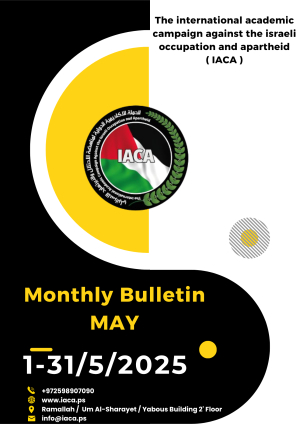 Monthly Bulletin MAY
Monthly Bulletin MAY
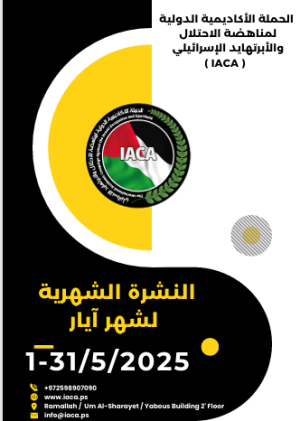 النشرة الشهرية باللغة العربية لشهر آيار 2025
النشرة الشهرية باللغة العربية لشهر آيار 2025
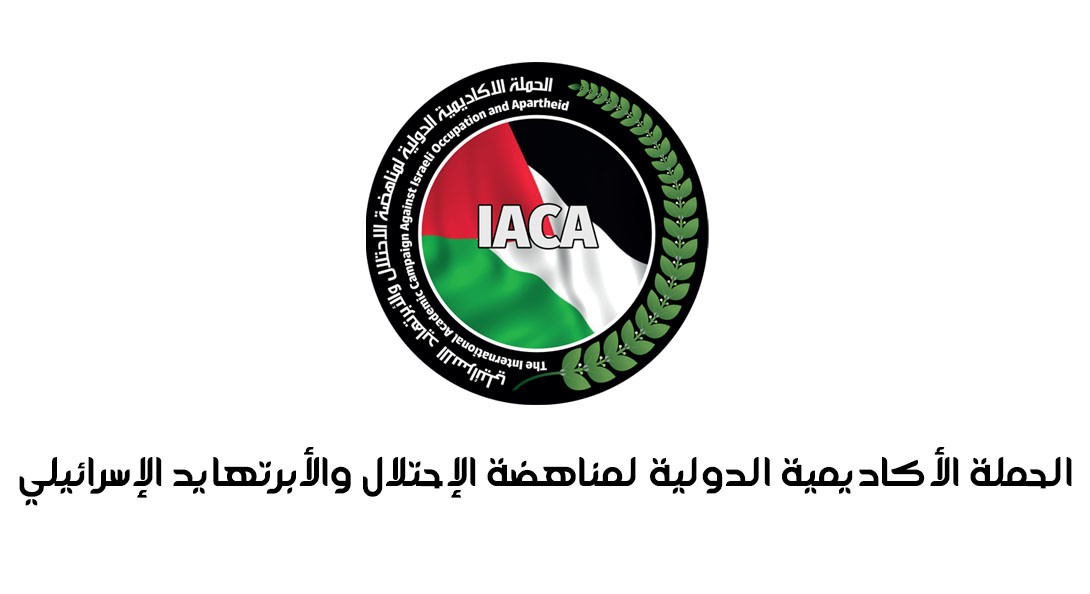 محادثات حرب غزة في #القاهرة تقلق تل أبيب
محادثات حرب غزة في #القاهرة تقلق تل أبيب
 الصاروخ اليمني يُفشل مفاوضات إسرائيل مع حماس ويفتح باب التصعيد
الصاروخ اليمني يُفشل مفاوضات إسرائيل مع حماس ويفتح باب التصعيد
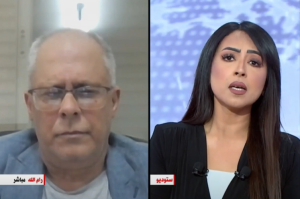 مناورة إسرائيلية للضغط على حماس في غزة.. فماذا فعلت؟
مناورة إسرائيلية للضغط على حماس في غزة.. فماذا فعلت؟
.jpeg) كلمة الحملة الاكاديمية الدولية في المؤتمر الختامي لمشاركة الوفد في زيارة وبرنامج عمل رسمي تم تنظيمه من قبل جامعة الاع ..
كلمة الحملة الاكاديمية الدولية في المؤتمر الختامي لمشاركة الوفد في زيارة وبرنامج عمل رسمي تم تنظيمه من قبل جامعة الاع ..
 إسرائيل تستغل احتلالها الأراضي في غزة لفرض شروطها على حماس
إسرائيل تستغل احتلالها الأراضي في غزة لفرض شروطها على حماس